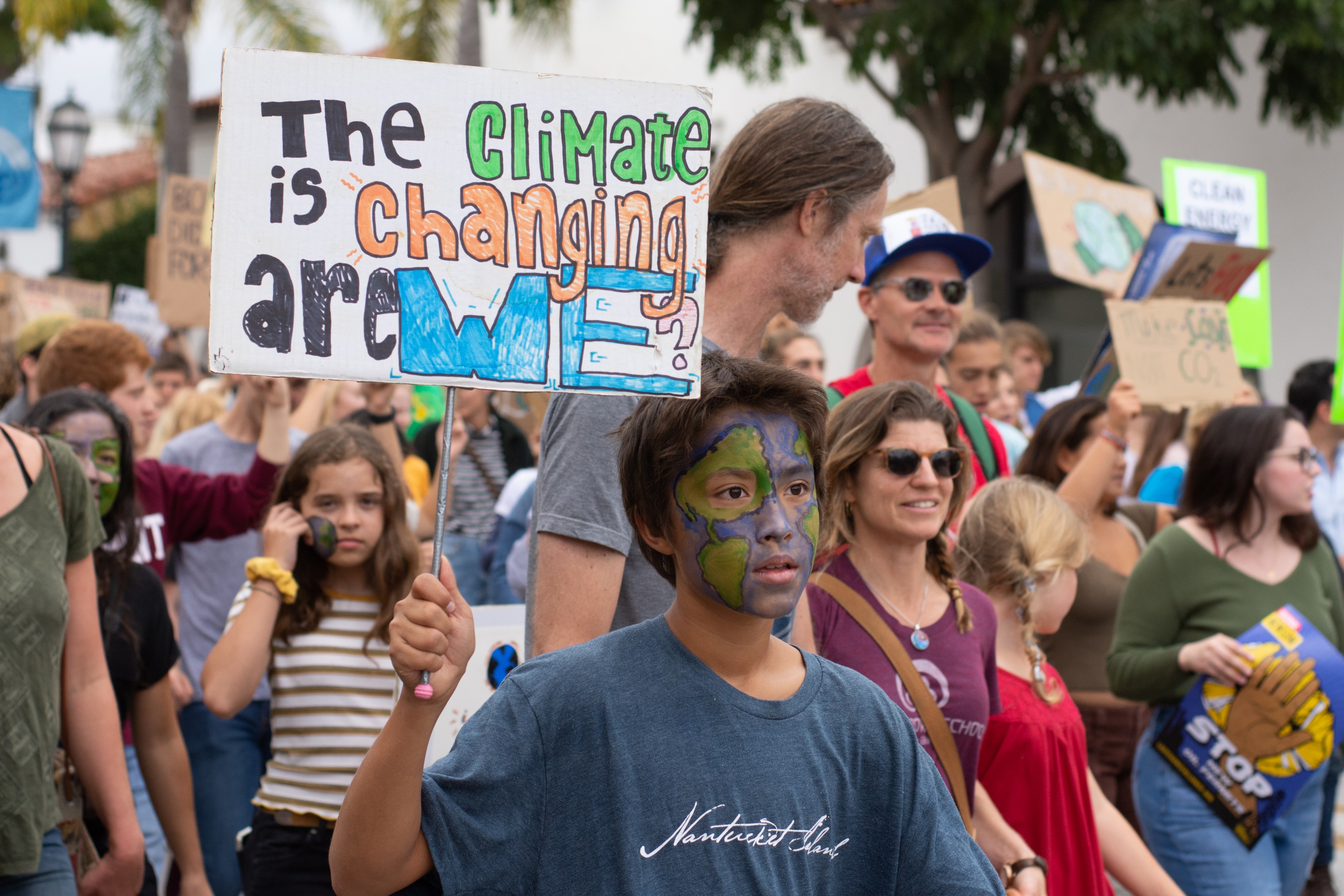Leah Stokes laid it on the line: “We cannot build another single piece of fossil fuel infrastructure and stay within safe carbon limits,” and then brought it home: “One half an inch of rain in five minutes is not normal. It’s climate change.” Speakers young and old rallied a Friday-afternoon De la Guerra Plaza crowd, roughly 800 people strong in Santa Barbara’s second climate strike in as many weeks. It’s time to act now on the slowly simmering crisis before it comes to a full boil, they warned.
The rain Stokes mentioned was, of course, the early morning deluge that preceded the 1/9 Debris Flow, which killed 23 people in Montecito after the Thomas Fire swept through the vegetation on the hillsides the month before. The other piece of fossil fuel infrastructure was the new steam-injection wells proposed for Santa Barbara County’s Cat Canyon by three oil companies.
Efforts on the personal level had to translate to larger movement from bigger actors, speakers said, emphasizing voting and politicians. They make climate policy on all levels, from water boards to school districts, said Luz Reyes-Martin, herself a Goleta school board member. Corporations were booed and cheered by the crowd, for ignoring the consequences of greenhouse gases in favor of profits and for taking corporate responsibility, respectively.
Corporate greed was a recurring theme, first expressed by James Yee, chair of the Barbareno Chumash tribe, reading a statement from Ernestine Ygnacio-De Soto, whose family has nurtured a cultural flame since the arrival of the Spanish priests. She urged, “Stop piercing the body of this Earth … and taking her blood for financial gain.” Emily Williams of Santa Barbara’s chapter of 350.org noted the importance of advocacy like the University of California’s divestment of oil stocks from its $13.4 billion endowment this month, with a similar purge from its $70 billion pension fund to come. (UC Treasurer Jagdeep Singh Bachher wrote in the L.A. Times that fossil-fuel assets posed a long-term risk to strong returns.)
Cat Canyon lies in the county’s 3rd District, whose supervisor, Joan Hartmann, said she was in the election fight of her life: “My opponent is supported by the oil industry,” she said, and described her district as the fulcrum that often decides the five-member board’s votes. She posed a riddle to the crowd: A lily pad in a pond grows twice as large every day. It covers the pond in 30 days. On what day did it cover half the pond? Her answer: “On the 29th day. That’s how fast this can come up on you.”
Hartmann noted that the UN’s most dire climate predictions were at a rise of 1.5 degrees Centigrade. “Ventura and Santa Barbara counties are at 2 degrees now,” she said, adding that climate change had a different effect on every region. She cautioned against simply pointing the finger at other countries, like China, which produces about 30 percent of the globe’s carbon emissions. They do that while making goods largely for the U.S., she reminded.
One of the most powerful speakers was Madai Quevado, a Santa Barbara High School student. She recounted, in Spanish and English, how her mother told her about pollution in her native Guatemala, which led to dead fish in the rivers. The pollution in third-world countries was so often the result of providing resources or food to first-world countries. “What future am I studying for,” Quevado asked, “if the generation before me can’t promise to hand me one?”
Though registering to vote, California’s 2020 Super Tuesday, and making voter calls came up, longtime environmental attorney Marc Chytilo made the point more bluntly: “This is an opportunity to expose and replace the traitor in the White House,” he said to loud cheers from the crowd. He added that two of Trump’s “stooges” would be at the Elks Lodge on Saturday: Ryan Zinke, “the disgraced architect of one of the biggest public land giveaways in history” (Zinke was Trump’s first Interior Secretary and reduced the size of national monuments for mining and drilling interests), and Mike Stoker, head of the region’s EPA, an agency that is trying to revoke California’s emissions standards, Chytilo said. “Four o’clock, or just before,” he said, “150 North Kellogg Road.”
The crowd, which had grown and was restive in the second hour of speeches, brought City College trustee Jonathan Abboud back to the stage to repeat Governor Gavin Newsom’s phone number (916-445-2841) to urge him to sign Senate Bill 1, which would lock in Obama-era standards for the environment and worker protections. SB1 has proved controversial; big agriculture and large water agencies, like Los Angeles, are unnerved that it puts habitat — for instance, for the Delta smelt — over the populace’s water needs.
Hungry for action, the throng cheered when strike organizer Brent Goodlet took the stage, asking if they were ready to march and holding his hand to his heart in appreciation of the nearly 1,000 people there. Waving their signs in the air, the crowd poured down State Street in a blocks-long stream of people, headed for Pershing Park.

